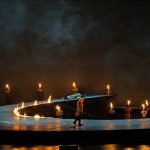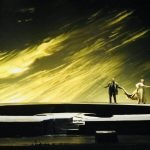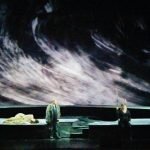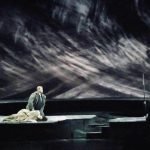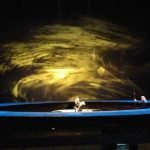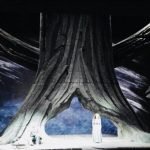The Hong Kong Philharmonic Orchestra’s intense, five-hour rendition of Richard Wagner’s “Die Walküre” (“The Valkyrie”) left classical-music lovers breathless, but yearning for more during the performance at the Beijing Poly Theater.
Conductor Jaap Van Zweden’s sense of pacing and drama never falters, with vivid climaxes including the frightening scene depicting the rage of Wotan, the king of gods, as he seeks out the warrior maiden Brünnhilde in the third act.
“Die Walküre” is the second installment of Wagner’s monumental opera tetralogy, “The Ring of the Nibelung,” about young lovers trying to flee their fate.
The Hong Kong Philharmonic, one of the most pre-eminent Wagner orchestras in the world, is in town as part of the Beijing Music Festival, which marks its 20th anniversary this year.
“It is also the 50th anniversary of the Salzburg Easter festival that was founded by one of the supreme conductors of all times — Herbert Von Karajan. We are playing his staging of ‘Die Walküre’ in Beijing,” said Michael Macleod, the Hong Kong Philharmonic’s chief executive. The orchestra will also perform Anton Bruckner’s Eighth Symphony at the Poly Theater on Oct 28.
Macleod has been instrumental in revamping the Hong Kong Philharmonic, which hadn’t recorded for nearly a decade when he took over in 2011, and in choosing Wagner’s so-called Ring Cycle as its artistic backbone.
Macleod’s interest in Wagner goes way back. “When I was the manager of a summer opera festival in New York, before coming to Hong Kong, I discovered an opera by Wagner that had never been performed in North America,” he said. “It was called ‘Der Liebes Verbot,’ or ‘The Ban on Love,’ and was inspired by Shakespeare’s ‘Measure for Measure.’”
Macleod’s quest for novelty has also inspired him to push for more audience engagement at classical music events and move away from a rigid programming style that could intimidate the uninitiated. For example, during his stint as executive director of the New Haven Symphony Orchestra in the U.S. state of Connecticut, he arranged a set of telescopes for concertgoers to view the night sky after listening to a rendition of “The Planets,” a seven-movement orchestral suite by English composer Gustav Holst. An iconic telescope that spotted Halley’s Comet centuries ago greeted them at the entrance to the concert hall.
He has added the same theatrical touch to the Hong Kong Philharmonic’s concerts. For example, when the orchestra played Ralph Vaughan Williams’ score for the 1948 film “Scott of the Antarctic,” which charts the harrowing journey of Robert Falcon Scott, an explorer who wanted to become the first Briton to reach the South Pole, the program included readings from his frozen diary, recovered months after his death on Antarctica.
Macleod is also hopeful about the future of Western classical music in China. “The average age of the audience in North America for a symphony orchestra concert is 69 years, according to statistics collected by an umbrella organization for orchestras. … In Hong Kong, there is no organization that collates these statistics, but by just looking in the hall on a regular basis, the average age is probably near 40 years. So it’s like a 30-year difference,” he said.
